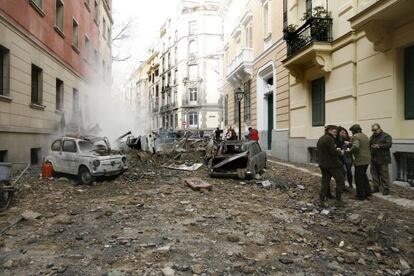Credits roll on Madrid’s film agency
Private group may take up public body’s mission of attracting movie shoots to the capital

Nobody is picking up the phone and the website is blank. The Madrid Film Commission, which was set up with the aim of attracting Hollywood blockbusters and TV commercial shoots to the Spanish capital, is no more.
Created 10 years ago by municipal and regional authorities to help international filmmakers find Spanish partners, identify filming locations, secure relevant permits, and hire local specialists and other associated services, the agency has died a long, drawn-out death that neither public officials nor private investors did anything to avoid.
Last June, agency managers got in touch with EL PAÍS to report the lack of financial support and the likelihood of the agency’s imminent demise if nothing was done.
The agency has died a drawn-out death that neither officials nor investors did anything to avoid
Yet there was a time when the commission, located in the suburban Madrid town of Pozuelo de Alarcón, had an annual budget of €600,000 to work with. “Shooting in Madrid has always been very expensive and complicated,” said Spanish moviemaker José Luis Borau in 2003, convinced that the sector urgently needed a promotional agency.
Other cities had film commissions, and there had been a national film agency since 2001, but there was nothing in Madrid, despite the fact it attracted 75 percent of all audiovisual productions in the country. This situation was set right in 2004 with the creation of the Madrid Film Commission.
The future lies in private hands
The fact that nobody is picking up the phone at the Madrid Film Commission does not mean that it has stopped ringing.
Filming permits in the capital have grown exponentially in recent years, up from 5,000 in 2004 to 8,500 this year.
The tasks that the extinct agency were performing for free could be taken up in a few months by a private association that would charge for them.
Regional and city authorities have agreed to leave this work in the hands of a new tourism promotion body that has just been created, funded mostly with private capital.
“We were surprised by Egeda’s decision to shut down the foundation, we’d made such an effort to keep it afloat,” said municipal sources.
But regional authorities trust that the new tourism promotion agency will soon pick up where the Madrid Film Commission left off – and perhaps even adopt its name.
At the time, politicians backed the plan enthusiastically. Both the city and the region insisted on sitting on the board of trustees, which included the Federation of Spanish Audiovisual Producer Associations (Fapae), copyright management agency Egeda, the Madrid Chamber of Commerce and the Madrid Business Confederation.
The commission’s first president was Enrique Cerezo, a producer who also headed Egeda and defended the importance of film shoots for the regional economy. “Thirty percent of the [production] budget is spent locally on catering, transport and so on, which means job creation,” he said.
Then Madrid regional premier Esperanza Aguirre added that the capital was Spain’s “film mecca” – “We want it to become a world-class filming location, and above all a European one.”
Those were the boom years. In 2006, a dozen film productions shot in the Madrid region left €55 million behind. Director Milos Forman’s US-Spanish production Goya’s Ghosts alone represented €20 million. Authorities used €800,000 of this amount to restore the 18th-century Palace of Infante Don Luis, located in Boadilla del Monte. At that point, the regional government figured that the audiovisual sector was contributing nearly two percent of regional GDP.
But just months later, Spain entered a protracted economic crisis that it has yet to overcome. As a result, a significant portion of the film and television industry went under while public subsidies were slashed.
The final blow was the 2012 decision to eliminate the blank media tax that was being charged on all equipment capable of making private copies of copyrighted work. According to Egeda, this was practically the Madrid Film Commission’s only source of funding.
“We are the only ones putting in any money!” complained sources at Egeda.
In 2013, the agency worked in an advisory capacity on 132 projects (114 Spanish, 18 foreign), helping obtain 1,538 permits (500 for international projects) and scout 146 filming locations (48 for foreign productions).
This year, the Madrid Film Commission had two public subsidies to work with: the regional government’s contribution of €30,000 – although agency sources said half of that amount was still forthcoming by year’s end – and €70,000 released by the municipal government on condition that most of it would be spent on producing a bilingual, 14-minute feature on the city showcasing its best spots.
A year ago, the commission was forced to lay off one of its three remaining employees. In July of this year, another one was let go and the director was left alone.
Tu suscripción se está usando en otro dispositivo
¿Quieres añadir otro usuario a tu suscripción?
Si continúas leyendo en este dispositivo, no se podrá leer en el otro.
FlechaTu suscripción se está usando en otro dispositivo y solo puedes acceder a EL PAÍS desde un dispositivo a la vez.
Si quieres compartir tu cuenta, cambia tu suscripción a la modalidad Premium, así podrás añadir otro usuario. Cada uno accederá con su propia cuenta de email, lo que os permitirá personalizar vuestra experiencia en EL PAÍS.
¿Tienes una suscripción de empresa? Accede aquí para contratar más cuentas.
En el caso de no saber quién está usando tu cuenta, te recomendamos cambiar tu contraseña aquí.
Si decides continuar compartiendo tu cuenta, este mensaje se mostrará en tu dispositivo y en el de la otra persona que está usando tu cuenta de forma indefinida, afectando a tu experiencia de lectura. Puedes consultar aquí los términos y condiciones de la suscripción digital.








































